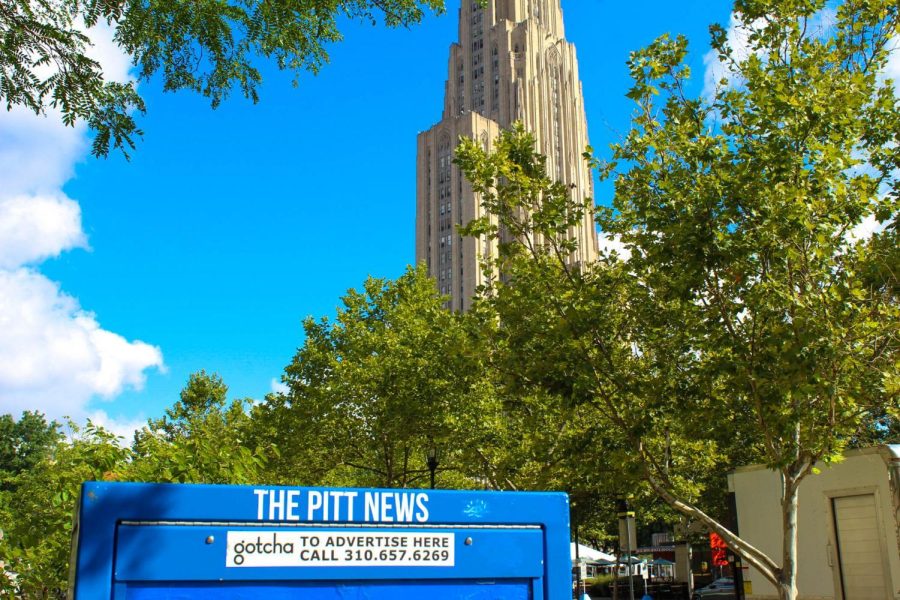New apartment complex coming to Oakland
June 10, 2014
Construction of a $70 million, eight-story apartment, hotel and retail complex will soon begin near Bates Street and the Boulevard of the Allies in Oakland if all goes well for the developers.
Oakland Gateway Ventures, a development team lead by Robert Dauer Jr. and Bill Kane, is planning to demolish 11 dilapidated townhouses on the Boulevard of the Allies and Bates Street in South Oakland for the large-scale complex. Construction is set to begin in about five months, according to Kane.
Just a few weeks after Oakland Gateway paid nearly $2.6 million for the site throughout March, April and May of this year, Kane and Dauer unveiled a preliminary plan for this new mixed-use development in a public meeting sponsored by Oakland Planning and Development Corporation on May 29. The draft designs for the project include an eight-story apartment building and a hotel of the same scale. All the parking will be built underground along with some retail space on the first floor.
The apartment component of the project will primarily consist of a mix of two- and three-bedroom units open to the public.
According to Kane, the preliminary plan is in a very early stage and many details are still under review.
Developers have yet to come to consensus about whether to incorporate the retail component because of differing opinions within the community. The building height is also yet to be decided. Kane said one of the biggest obstacles for the developers right now is to meet the zoning requirement, which requires buildings to be shorter than 80 feet tall.
Wanda Wilson, executive director of OPDC, said that the primary concerns for the development at this stage are traffic, parking and reconstruction of the open space.
Kane said some residents have expressed reservations about how the massive complex might alter the traffic and road conditions in the neighborhood. Kane also said the proposal includes plans to close Zulema Street, but that the developers are still very unsure if the closure will happen because of discontent from residents near Zulema.
Wilson said some residents believe the development proposal presents a challenge to the Oakland 2025 Master Plan, a five-part document containing goals OPDC hopes to complete by 2025. The Oakland 2025 Master Plan, unveiled in Nov. 2012, is a broad-based community plan that aims to support quality of life.
“It shouldn’t be characterized as a ‘challenge.’ It doesn’t necessarily help to address some of the traffic concerns the way we thought about them,” Wilson said. “But, overall, it’s just a different proposal. Parts of the development plan are consistent with the Oakland 2025 Master Plan and parts aren’t.”
But Kane said Oakland Gateway’s proposal is mostly consistent with the Master Plan, which has a goal of adding new apartment properties in South Oakland to replace its streets of bedraggled tenements.
Pitt students expressed mixed opinions on the large-scale development.
“There are a lot of crappy houses in South Oakland. If I have to live in Oakland, I will want to live in a nice apartment building. The apartments have to be well-kept,” Anna Stulga, a senior business major, said. “I also think that an upscale apartment building might possibly bring in more residents for Oakland.”
Chris Bennett, a junior film studies major, said the development could help the University community.
“I think the retail can be beneficial to Pitt students,” he said. “It offers more jobs. It will also give us more housing options.”
Stulga recognized the concerns brought up by the development proposal.
“It might change the landscape down there because it’s a really big building, and it might affect the lifestyle of the local residents,” she said.
Tory Hamrick, a junior microbiology major, agreed that the development could change the lifestyle of Oakland residents.
“I don’t think interfering with the local residents is a good idea,” she said.
Wilson said that OPDC would continue to facilitate the developers to improve the proposal of the project and also collect feedback from the community for the developers.
Kane said he doesn’t think the apartment complex would add additional traffic to the neighborhood because the majority of the student renters don’t have cars and the complex will include a substantial amount of subsurface parking space.
According to Kane, four student representatives from both Pitt and CMU attended the community meeting and spoke out about the apartment shortage in Oakland and how they favor this development plan in front of the community members.
Wilson said it is too early for the community to understand what the developers are proposing. Developers have to further explain some of their concepts to the residents.
Steve Sortino, a 74-year-old Oakland resident, said he thinks the majority of the permanent residents are currently against the construction of the complex. Sortino grew up on Coltart Street, close to where the construction will be and has never lived outside of Oakland. Sortino’s main concern was the possible Zulema Street closure.
“[The permanent residents] thought it might disrupt the traffic pattern,” Sortino said. “They were concerned about the height of the building. They thought a nine-story high building is too high.”
Sortino said he didn’t want college students to take over Coltart Street, which many older residents consider to be the last bastion of the old Oakland culture.
Olivia Izzo, a junior art history and French major at Pitt, was a tenant in one of the older townhouses on Bates. She said she liked her house and worried the new apartment complex might not be as affordable as the current houses for Pitt students. Oakland Gateway has not yet disclosed any potential rental rates for the complex. Kane said he will remain positive about progress of the project.







